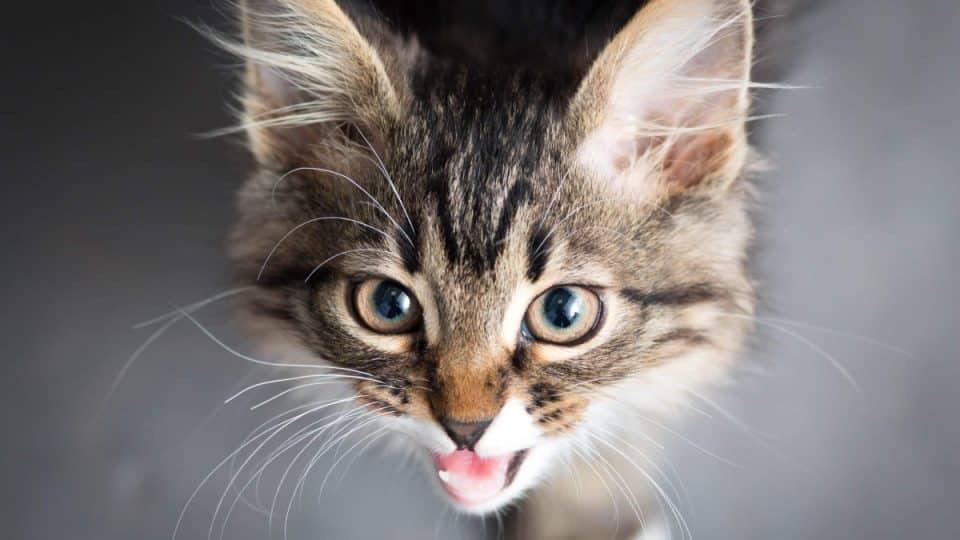If you’ve ever found yourself perplexed by your feline friend who seems to open their mouth wide in an exaggerated meow, only to produce no sound, you’re not alone! The phenomenon known as a “silent meow” is one of the many quirks that make cats both fascinating and endearing companions. While traditional meows can be a cat’s way of communicating with humans and other pets, silent meows add an extra layer of mystery to their communication repertoire.
In this article, we’ll dive into the reasons behind this unique behavior, the possible meanings it holds, and what it reveals about your cat’s personality and emotions. So, if you’re eager to decode your cat’s silent communications, read on to discover the charm and significance behind those quiet expressions!
Table of Contents
- Understanding the Silent Meow: What It Means for Your Cat
- The Reasons Behind Silent Meowing: Communication and Emotion
- Enhancing Your Connection: Tips for Responding to Silent Meows
- When to Seek Help: Understanding Behavioral Changes in Your Feline Friend
- Q&A
- The Way Forward
Understanding the Silent Meow: What It Means for Your Cat
Cats are known for their wide range of vocalizations, but the silent meow is one of the most intriguing behaviors they exhibit. Unlike the traditional meow, which is often loud and demanding, a silent meow consists of opening the mouth without producing sound. This unique communication method can be confusing for cat owners, but it typically signifies a few distinct emotions or needs. Most commonly, a silent meow can indicate that your cat is seeking attention, affection, or companionship without the need for noise. It’s their way of saying, “I’m here, let’s connect!”
Understanding the context in which your cat performs this silent vocalization is vital. Here are some factors to consider:
- Emotional State: A silent meow can reflect your cat’s mood, such as contentment or curiosity.
- Attention Seeking: If your cat frequently approaches you with this behavior, they may simply want some petting or playtime.
- Health Indicators: In rare cases, a sudden change in vocalization patterns may signal health issues, so observation is key.
The Reasons Behind Silent Meowing: Communication and Emotion
Cats are fascinating creatures with a unique way of communicating that often leaves their owners pondering. Silent meowing is one such trait that highlights the complexity of feline communication. While the soundless meow may seem puzzling, it can stem from various emotional states. These can include contentment, frustration, or desire for attention. When your cat engages in silent meowing, they might be trying to convey their feelings or needs without the typical vocalizations. This behavior can also serve as an invitation for interaction, encouraging you to notice them and respond to their silent plea.
Moreover, silent meowing can reveal the strong bonds that cats forge with their humans. Unlike louder vocalizations, which may be used to assert dominance or signal distress, silent meows are often a sign of affection and trust. Here are some key factors influencing silent meowing:
- Social interaction: Cats often adapt their communication styles to their environment and the presence of their owners.
- Health indicators: Changes in vocalization patterns can sometimes indicate health issues, so it’s worth paying attention to your cat’s overall behavior.
- Age factors: Older cats might adopt silent meowing as their vocal cords change over time.
Enhancing Your Connection: Tips for Responding to Silent Meows
Responding to your cat’s silent meows can enhance your bond and help you understand their needs better. Here are some tips to effectively communicate with your feline friend:
- Observe Body Language: Pay close attention to your cat’s posture, tail position, and facial expressions. These non-verbal cues can provide insights into what they might be trying to express.
- Respond with Softness: When your cat gives you that silent meow, respond gently with soothing words or soft vocalizations, letting them know you’re listening.
- Engage in Play: Often, silent meows are a call for attention or playtime. Engaging in interactive play can fulfill their social needs and strengthen your connection.
- Create a Comfortable Space: Ensure your cat has a cozy space to retreat to. A secure and comfortable environment can help them feel safe to communicate more openly.
Additionally, implementing a few lifestyle changes can help nurture this unique form of communication:
| Change | Benefit |
|---|---|
| Consistent Feeding Schedule | Reduces anxiety and helps them feel more secure. |
| Quality Time Together | Enhances emotional bonds and promotes trust. |
| Enrichment Activities | Stimulates mental engagement, leading to more expressive communication. |
When to Seek Help: Understanding Behavioral Changes in Your Feline Friend
It’s essential to recognize when your cat’s behavior warrants concern. Changes in your feline friend’s demeanor can indicate underlying issues that may require attention. Consider seeking help if you observe:
- Increased vocalization: If your cat’s silent meows become more frequent or intense.
- Apathy: Loss of interest in activities they once enjoyed, like playtime or cuddling.
- Changes in appetite: Sudden weight loss or gain can be a sign of health problems.
- Excessive hiding: If your cat has started to isolate themselves or avoids interaction.
In addition to these behavioral signs, pay attention to physical changes that might accompany them. If your cat exhibits any of the following symptoms, it’s time to consult a veterinarian:
| Symptom | Possible Concern |
| Vomiting | Digestive issues or illness |
| Increased aggression | Pain or discomfort |
| Changes in grooming habits | Stress or health problems |
| Changes in litter box habits | Urinary tract infections or anxiety |
Q&A
Q1: What is a silent meow?
A1: A silent meow is when your cat opens its mouth as if it wants to meow, but no sound comes out. It can be quite amusing and may leave you wondering what your furry friend is trying to communicate.
Q2: Why do cats silent meow instead of vocalizing?
A2: Cats may silent meow for various reasons, including their individual personality, breed traits, or as a form of communication with their human companions. Some cats are naturally quieter, while others may use silent meows to express affection or seek attention without being too loud.
Q3: Is silent meowing common among all cat breeds?
A3: Not all cats silent meow, but it’s more common in certain breeds known for being more vocal, such as Siamese or Burmese cats. However, every cat is unique, and their behavior can vary widely regardless of breed.
Q4: What might my cat be trying to tell me with a silent meow?
A4: Your cat might be trying to convey different messages with a silent meow. It could be a request for food, an invitation to play, or simply a way to show affection. Observing your cat’s body language and other behaviors can help you understand their needs better.
Q5: Should I be concerned if my cat silent meows often?
A5: Generally, silent meowing is not a cause for concern. It’s often just a quirky behavior. However, if you notice a sudden change in your cat’s vocalizations or overall behavior—like lethargy or loss of appetite—it’s a good idea to consult your veterinarian.
Q6: How can I respond to my cat’s silent meows?
A6: Responding to your cat’s silent meows can be fun! You can try engaging with them through playtime, offering treats, or simply giving them some affectionate petting. This positive interaction can strengthen your bond and help your cat feel understood.
Q7: Are there other unique vocalizations that cats make?
A7: Yes! Cats communicate through a variety of vocalizations, including purring, chirping, and trilling. Each sound conveys different emotions or needs, making your feline friend’s communication quite rich and varied.
Q8: Is there a way to encourage my cat to vocalize more?
A8: If you’d like to encourage your cat to vocalize more, you can try interacting with them using toys, engaging in play, or using treats to elicit a response. Some cats may naturally become more vocal as they feel more comfortable and confident in their environment.
Q9: Can silent meowing be a sign of stress or anxiety?
A9: While silent meowing itself is not necessarily an indicator of stress, any change in your cat’s vocal habits or behavior could signal anxiety or discomfort. If you notice other signs of stress—such as hiding, aggression, or changes in grooming—consider seeking advice from a vet or animal behaviorist.
Q10: How can I better understand my cat’s unique communication style?
A10: Building a strong bond with your cat through observation and interaction is key. Pay attention to their body language, context, and vocalizations. Keeping a consistent routine can also help your cat feel secure, making it easier for you to understand their unique ways of communicating.
The Way Forward
the silent meow is a fascinating quirk that adds to the diverse and charming personality of our feline friends. While the reasons behind this unique behavior may vary from cat to cat, it’s clear that silent meowing is often a form of communication, expressing everything from affection to a simple request for attention. By paying close attention to their body language and the context in which they engage in this behavior, you can deepen your bond with your cat and better understand their needs. So the next time your furry companion gives you that silent meow, remember that it’s just another way they say, “I love you” or “I need something.” Embrace these moments and continue to explore the intriguing world of feline communication—each silent meow is a reminder of the special connection you share with your pet. Happy observing!
















